MPGM PROJ-6006: Org. Behaviour & People Management Discussion Board
VerifiedAdded on 2023/06/16
|5
|982
|105
Discussion Board Post
AI Summary
This discussion board post reflects on various aspects of organizational behavior and people management within a project team context. It covers topics such as legitimate and reward power demonstrated by leaders, the influence of reward and punishment, expert power in global teams, and the differences between influence and manipulation. The post also addresses the advantages and challenges of diverse teams, emphasizing the importance of communication and problem-solving skills. Various communication tools and techniques are discussed, including verbal communication, email, digital media (Slack, Skype, Dropbox), project boards, and project management tools like PivotalTracker and Basecamp, to facilitate effective collaboration among team members. The reflections are supported by relevant academic literature.
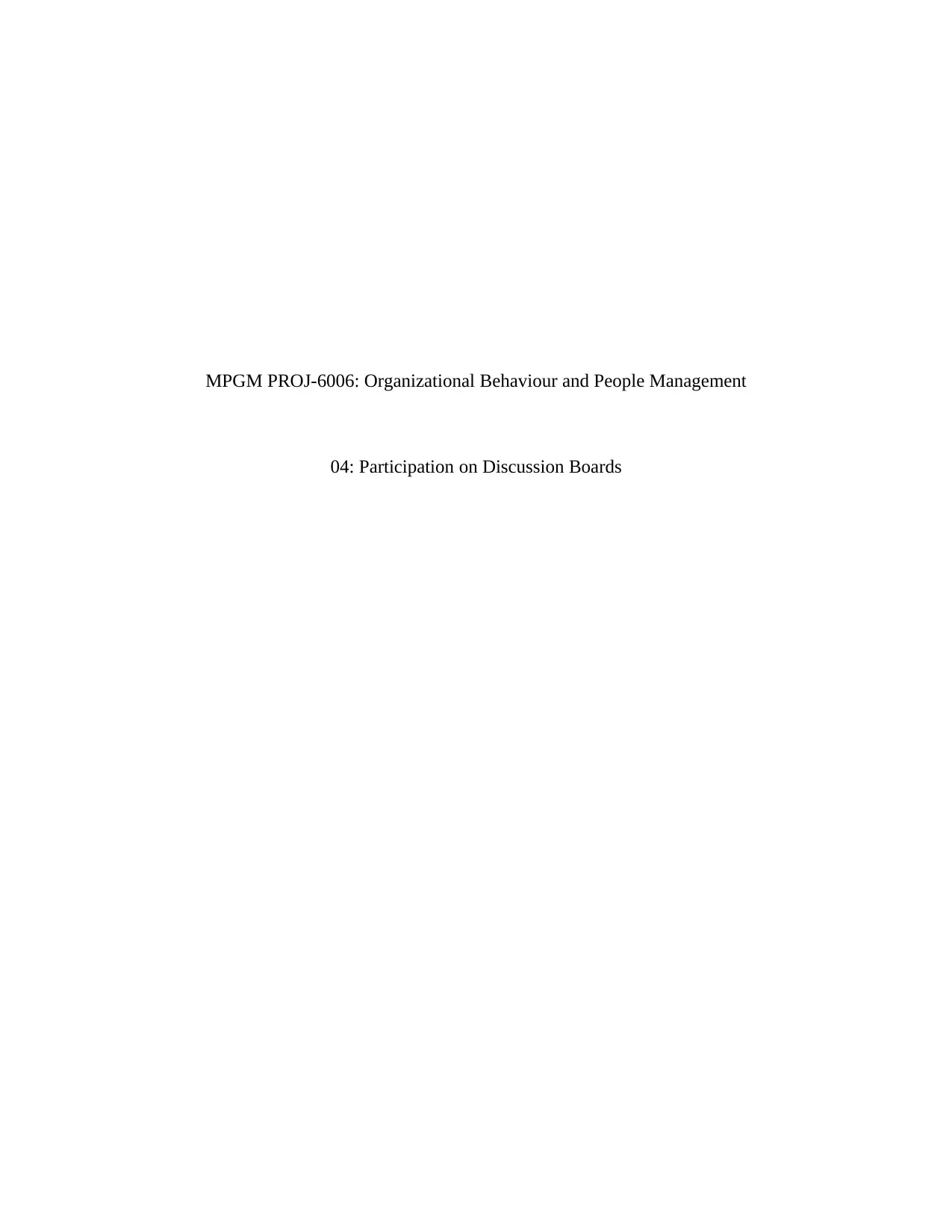
MPGM PROJ-6006: Organizational Behaviour and People Management
04: Participation on Discussion Boards
04: Participation on Discussion Boards
Paraphrase This Document
Need a fresh take? Get an instant paraphrase of this document with our AI Paraphraser
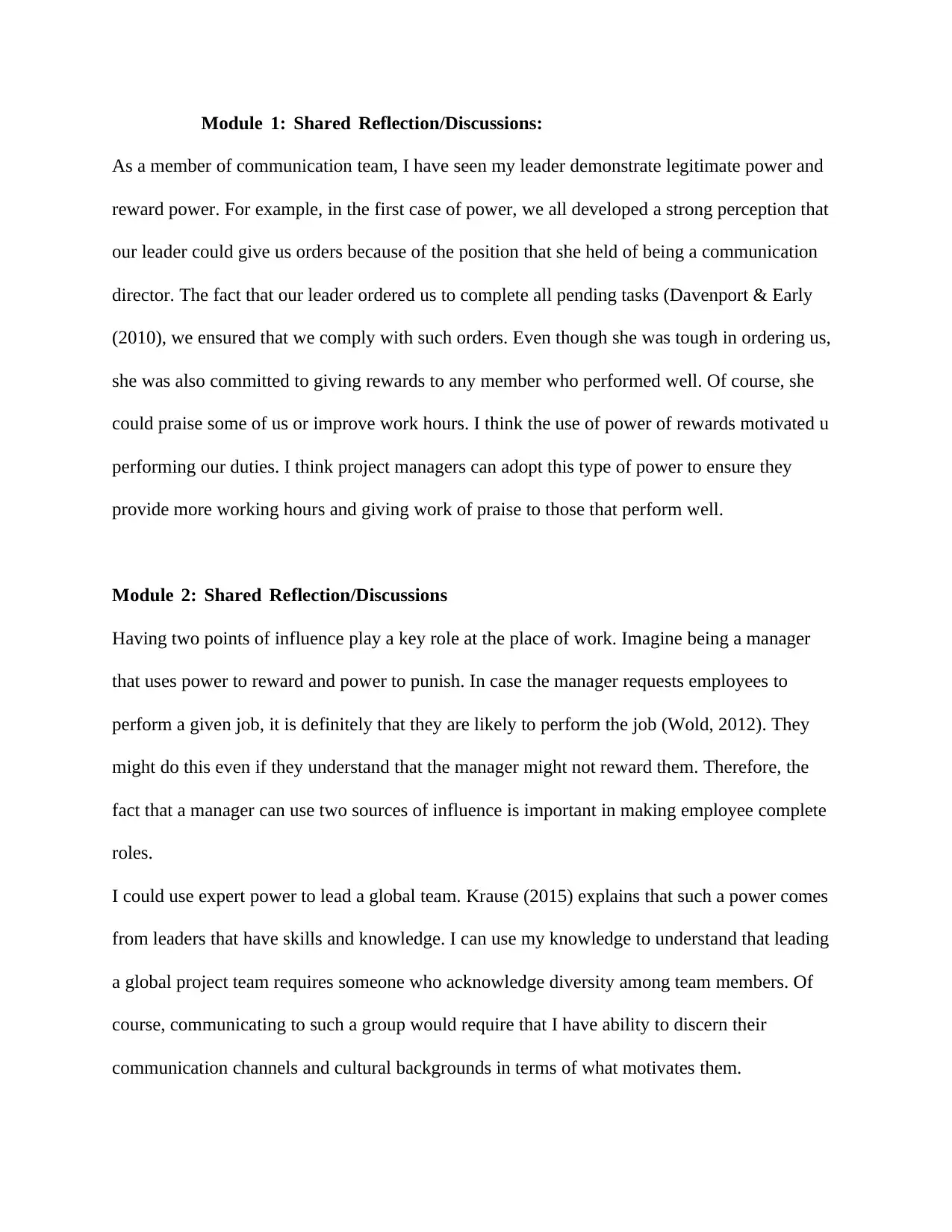
Module 1: Shared Reflection/Discussions:
As a member of communication team, I have seen my leader demonstrate legitimate power and
reward power. For example, in the first case of power, we all developed a strong perception that
our leader could give us orders because of the position that she held of being a communication
director. The fact that our leader ordered us to complete all pending tasks (Davenport & Early
(2010), we ensured that we comply with such orders. Even though she was tough in ordering us,
she was also committed to giving rewards to any member who performed well. Of course, she
could praise some of us or improve work hours. I think the use of power of rewards motivated u
performing our duties. I think project managers can adopt this type of power to ensure they
provide more working hours and giving work of praise to those that perform well.
Module 2: Shared Reflection/Discussions
Having two points of influence play a key role at the place of work. Imagine being a manager
that uses power to reward and power to punish. In case the manager requests employees to
perform a given job, it is definitely that they are likely to perform the job (Wold, 2012). They
might do this even if they understand that the manager might not reward them. Therefore, the
fact that a manager can use two sources of influence is important in making employee complete
roles.
I could use expert power to lead a global team. Krause (2015) explains that such a power comes
from leaders that have skills and knowledge. I can use my knowledge to understand that leading
a global project team requires someone who acknowledge diversity among team members. Of
course, communicating to such a group would require that I have ability to discern their
communication channels and cultural backgrounds in terms of what motivates them.
As a member of communication team, I have seen my leader demonstrate legitimate power and
reward power. For example, in the first case of power, we all developed a strong perception that
our leader could give us orders because of the position that she held of being a communication
director. The fact that our leader ordered us to complete all pending tasks (Davenport & Early
(2010), we ensured that we comply with such orders. Even though she was tough in ordering us,
she was also committed to giving rewards to any member who performed well. Of course, she
could praise some of us or improve work hours. I think the use of power of rewards motivated u
performing our duties. I think project managers can adopt this type of power to ensure they
provide more working hours and giving work of praise to those that perform well.
Module 2: Shared Reflection/Discussions
Having two points of influence play a key role at the place of work. Imagine being a manager
that uses power to reward and power to punish. In case the manager requests employees to
perform a given job, it is definitely that they are likely to perform the job (Wold, 2012). They
might do this even if they understand that the manager might not reward them. Therefore, the
fact that a manager can use two sources of influence is important in making employee complete
roles.
I could use expert power to lead a global team. Krause (2015) explains that such a power comes
from leaders that have skills and knowledge. I can use my knowledge to understand that leading
a global project team requires someone who acknowledge diversity among team members. Of
course, communicating to such a group would require that I have ability to discern their
communication channels and cultural backgrounds in terms of what motivates them.
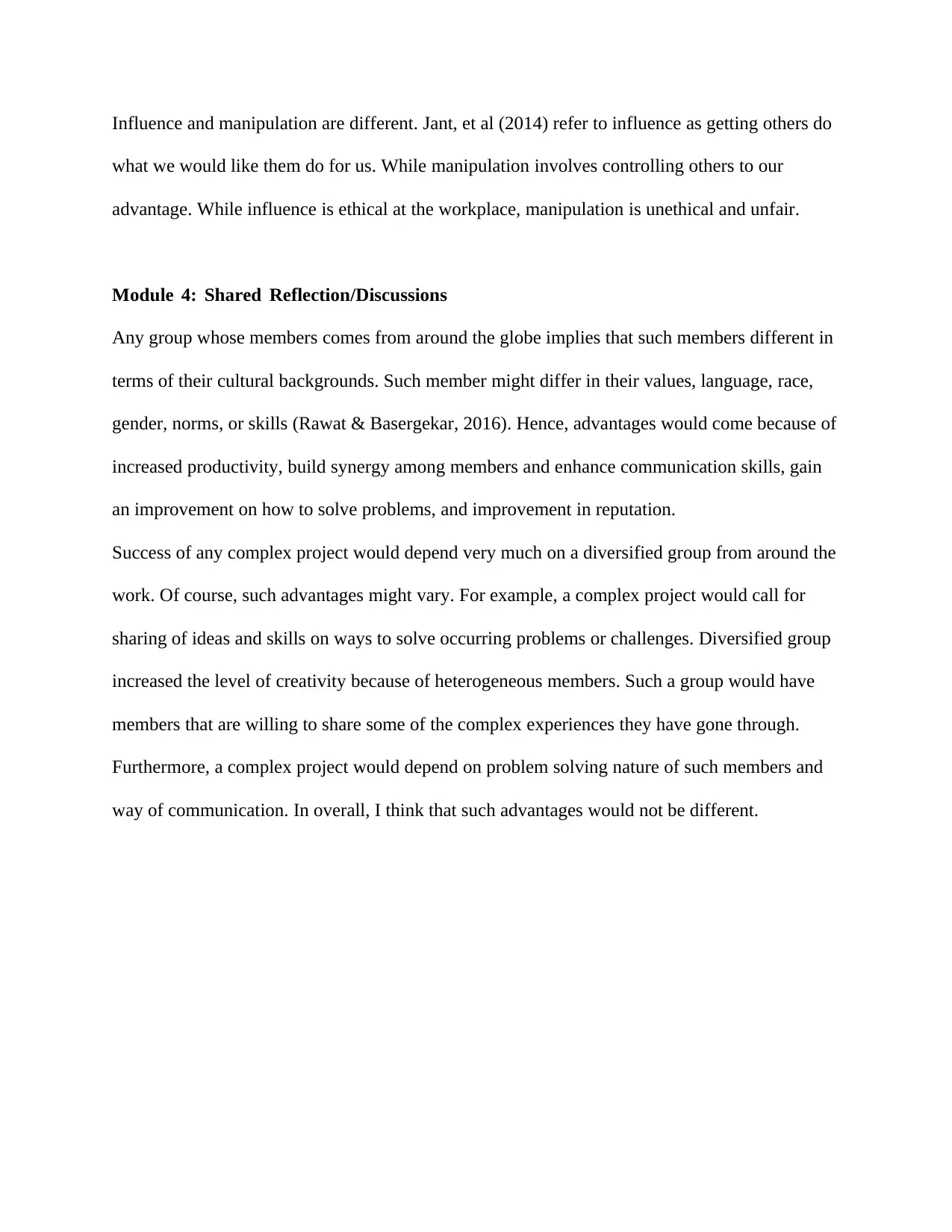
Influence and manipulation are different. Jant, et al (2014) refer to influence as getting others do
what we would like them do for us. While manipulation involves controlling others to our
advantage. While influence is ethical at the workplace, manipulation is unethical and unfair.
Module 4: Shared Reflection/Discussions
Any group whose members comes from around the globe implies that such members different in
terms of their cultural backgrounds. Such member might differ in their values, language, race,
gender, norms, or skills (Rawat & Basergekar, 2016). Hence, advantages would come because of
increased productivity, build synergy among members and enhance communication skills, gain
an improvement on how to solve problems, and improvement in reputation.
Success of any complex project would depend very much on a diversified group from around the
work. Of course, such advantages might vary. For example, a complex project would call for
sharing of ideas and skills on ways to solve occurring problems or challenges. Diversified group
increased the level of creativity because of heterogeneous members. Such a group would have
members that are willing to share some of the complex experiences they have gone through.
Furthermore, a complex project would depend on problem solving nature of such members and
way of communication. In overall, I think that such advantages would not be different.
what we would like them do for us. While manipulation involves controlling others to our
advantage. While influence is ethical at the workplace, manipulation is unethical and unfair.
Module 4: Shared Reflection/Discussions
Any group whose members comes from around the globe implies that such members different in
terms of their cultural backgrounds. Such member might differ in their values, language, race,
gender, norms, or skills (Rawat & Basergekar, 2016). Hence, advantages would come because of
increased productivity, build synergy among members and enhance communication skills, gain
an improvement on how to solve problems, and improvement in reputation.
Success of any complex project would depend very much on a diversified group from around the
work. Of course, such advantages might vary. For example, a complex project would call for
sharing of ideas and skills on ways to solve occurring problems or challenges. Diversified group
increased the level of creativity because of heterogeneous members. Such a group would have
members that are willing to share some of the complex experiences they have gone through.
Furthermore, a complex project would depend on problem solving nature of such members and
way of communication. In overall, I think that such advantages would not be different.
⊘ This is a preview!⊘
Do you want full access?
Subscribe today to unlock all pages.

Trusted by 1+ million students worldwide
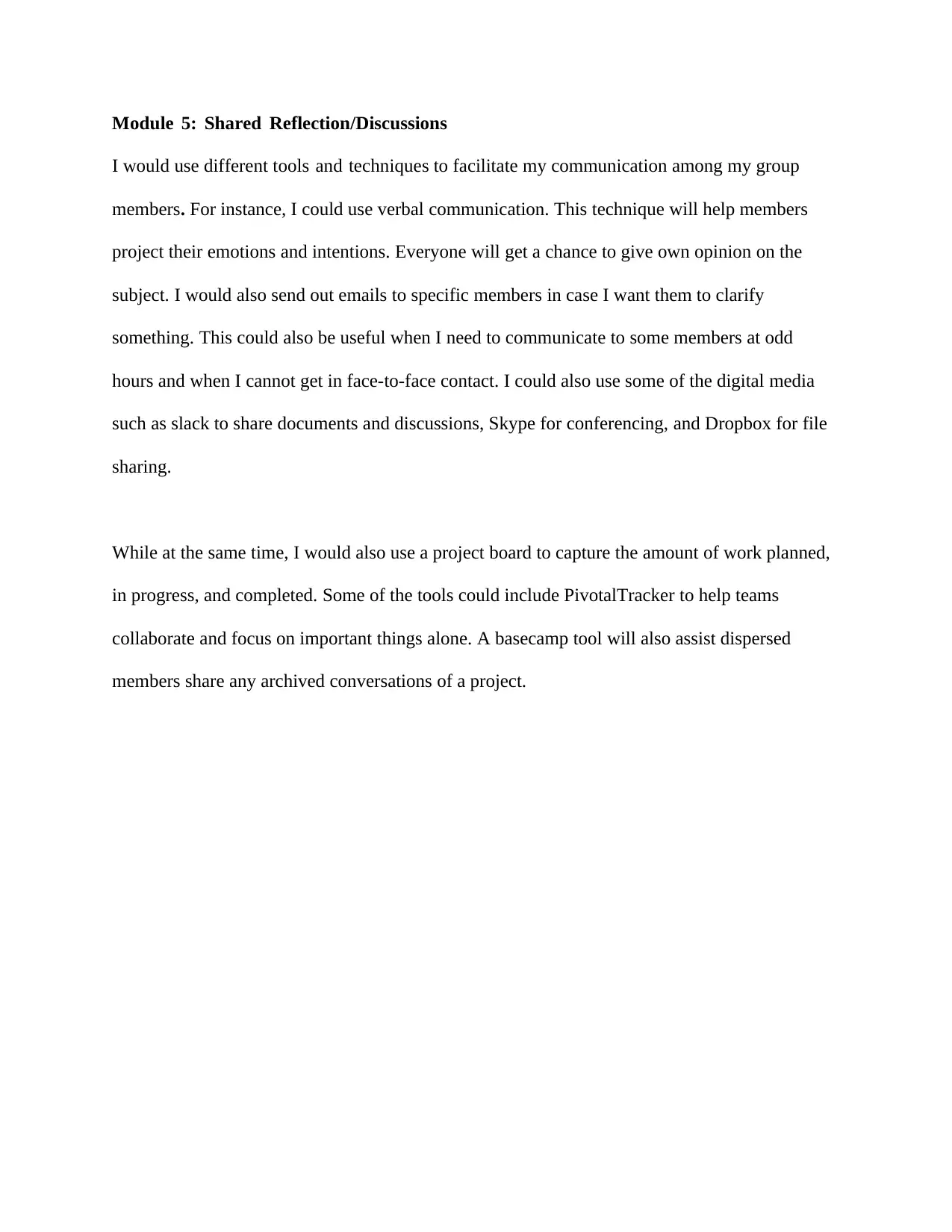
Module 5: Shared Reflection/Discussions
I would use different tools and techniques to facilitate my communication among my group
members. For instance, I could use verbal communication. This technique will help members
project their emotions and intentions. Everyone will get a chance to give own opinion on the
subject. I would also send out emails to specific members in case I want them to clarify
something. This could also be useful when I need to communicate to some members at odd
hours and when I cannot get in face-to-face contact. I could also use some of the digital media
such as slack to share documents and discussions, Skype for conferencing, and Dropbox for file
sharing.
While at the same time, I would also use a project board to capture the amount of work planned,
in progress, and completed. Some of the tools could include PivotalTracker to help teams
collaborate and focus on important things alone. A basecamp tool will also assist dispersed
members share any archived conversations of a project.
I would use different tools and techniques to facilitate my communication among my group
members. For instance, I could use verbal communication. This technique will help members
project their emotions and intentions. Everyone will get a chance to give own opinion on the
subject. I would also send out emails to specific members in case I want them to clarify
something. This could also be useful when I need to communicate to some members at odd
hours and when I cannot get in face-to-face contact. I could also use some of the digital media
such as slack to share documents and discussions, Skype for conferencing, and Dropbox for file
sharing.
While at the same time, I would also use a project board to capture the amount of work planned,
in progress, and completed. Some of the tools could include PivotalTracker to help teams
collaborate and focus on important things alone. A basecamp tool will also assist dispersed
members share any archived conversations of a project.
Paraphrase This Document
Need a fresh take? Get an instant paraphrase of this document with our AI Paraphraser
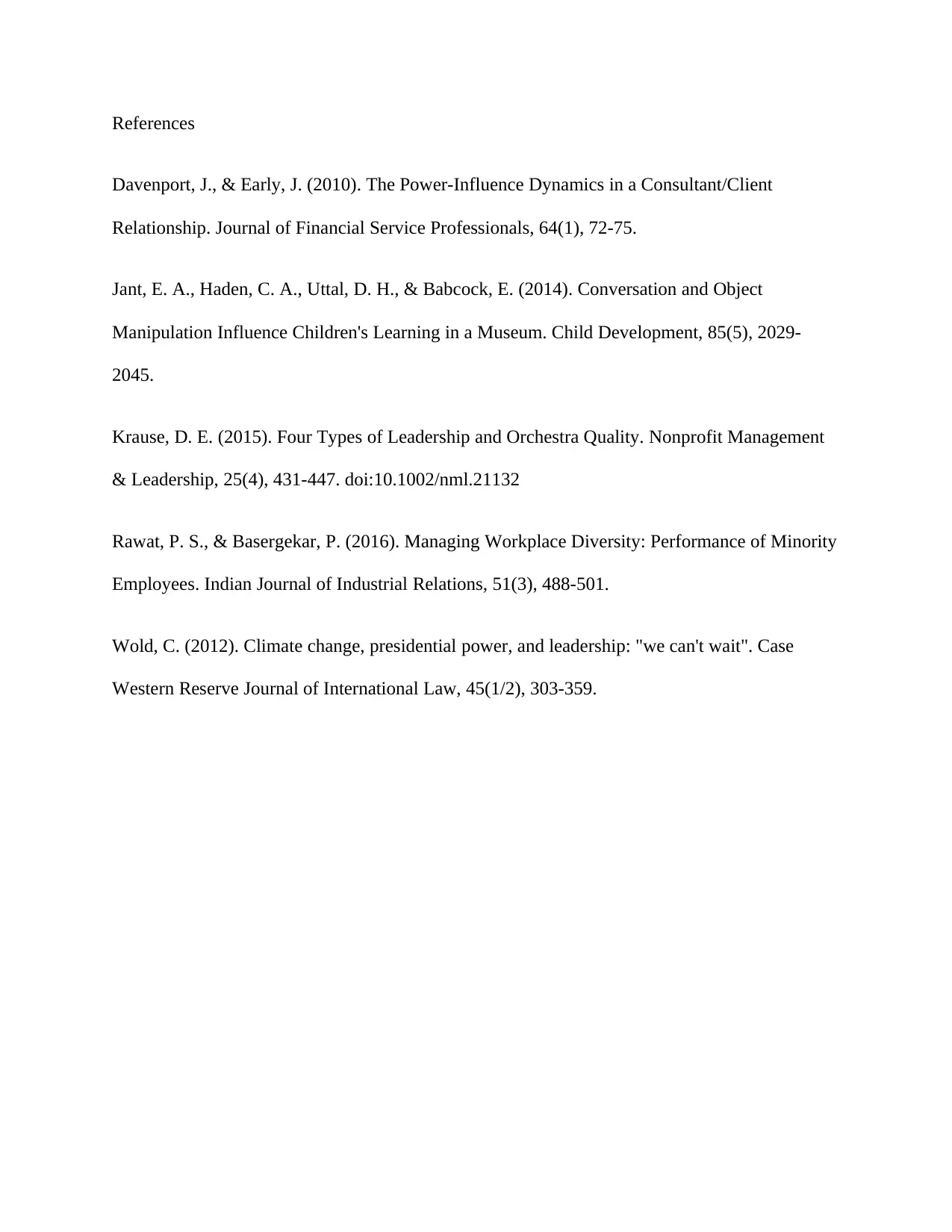
References
Davenport, J., & Early, J. (2010). The Power-Influence Dynamics in a Consultant/Client
Relationship. Journal of Financial Service Professionals, 64(1), 72-75.
Jant, E. A., Haden, C. A., Uttal, D. H., & Babcock, E. (2014). Conversation and Object
Manipulation Influence Children's Learning in a Museum. Child Development, 85(5), 2029-
2045.
Krause, D. E. (2015). Four Types of Leadership and Orchestra Quality. Nonprofit Management
& Leadership, 25(4), 431-447. doi:10.1002/nml.21132
Rawat, P. S., & Basergekar, P. (2016). Managing Workplace Diversity: Performance of Minority
Employees. Indian Journal of Industrial Relations, 51(3), 488-501.
Wold, C. (2012). Climate change, presidential power, and leadership: "we can't wait". Case
Western Reserve Journal of International Law, 45(1/2), 303-359.
Davenport, J., & Early, J. (2010). The Power-Influence Dynamics in a Consultant/Client
Relationship. Journal of Financial Service Professionals, 64(1), 72-75.
Jant, E. A., Haden, C. A., Uttal, D. H., & Babcock, E. (2014). Conversation and Object
Manipulation Influence Children's Learning in a Museum. Child Development, 85(5), 2029-
2045.
Krause, D. E. (2015). Four Types of Leadership and Orchestra Quality. Nonprofit Management
& Leadership, 25(4), 431-447. doi:10.1002/nml.21132
Rawat, P. S., & Basergekar, P. (2016). Managing Workplace Diversity: Performance of Minority
Employees. Indian Journal of Industrial Relations, 51(3), 488-501.
Wold, C. (2012). Climate change, presidential power, and leadership: "we can't wait". Case
Western Reserve Journal of International Law, 45(1/2), 303-359.
1 out of 5
Related Documents
Your All-in-One AI-Powered Toolkit for Academic Success.
+13062052269
info@desklib.com
Available 24*7 on WhatsApp / Email
![[object Object]](/_next/static/media/star-bottom.7253800d.svg)
Unlock your academic potential
Copyright © 2020–2026 A2Z Services. All Rights Reserved. Developed and managed by ZUCOL.





